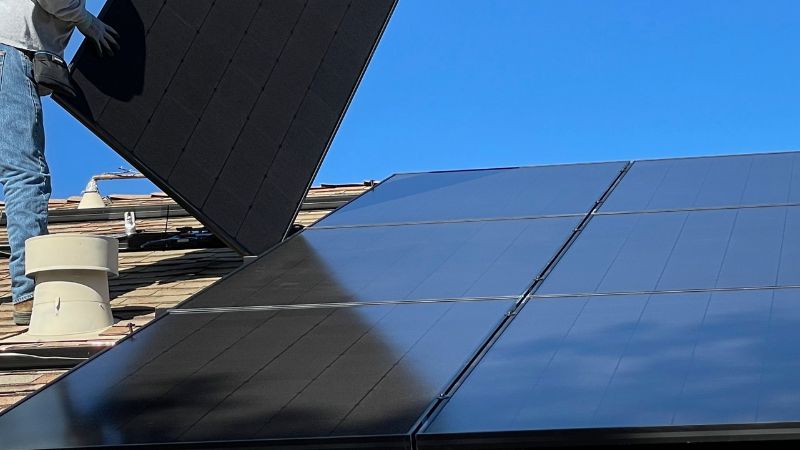What Is the Life Span of a Typical Solar Panel?

Have you ever thought about installing a solar panel in your household? It is an environmentally friendly and economical way to generate energy. More and more households are switching to off-grid or grid-tied solar panels to save on electricity bills. Consumers in states like Texas who are looking to install a grid-tied solar system are looking at electricity rates comparison texas to find an energy provider that uses solar power and can provide the best rates. But is its lifespan worth the investment in the installation? Read on and find out.
Manufacturers usually give a 25-year warranty. But this is the minimum period, in fact, solar panels can work longer. Of course, performance decreases over time, but it does not disappear completely. The lifespan depends on many factors, which we will consider today. Perhaps this will help you to make a choice in favour of energy sources that are environmentally friendly.
What Affects the Lifespan of a Solar Panel?
Solar panels’ lifespan depends on different factors. For instance, a 300 watts solar panel should produce at least 240 watts (80% of its rated power) at the conclusion of the 25-year warranty. A 100 watt solar panel will generate 80 watts of power. The following variables affect the solar panels‘ service life:
- the quality of the solar panels;
- reliability of the installation;
- maintenance of the entire power plant;
- the type of system (for example, harbor freight solar panel, ring solar panel, etc).
Investing in a solar power plant is a long-term investment. The initial costs can be significant, which scares many people. But over time, they pay off due to the “green” tariff and monthly savings on grid electricity bills. In addition, in some countries, it is possible to sell excess energy to the state.
How long will the solar panels endure and how quickly will they pay for themselves are one of the first concerns consumers ask when they are planning their long-term investment. Let’s do some maths: Solar panels lose efficiency from 0.5% to 1% annually. Your panels should therefore continue to produce electricity at 75 to 87.5% of their rated capacity after the 25-year guarantee has expired.
According to the NREL study “Photovoltaic Degradation Rates” by NREL, 80% of solar panels continue to function after their warranty has expired. In fact, some older models have been generating electricity for more than 40 years. At the same time, their expected service life is still decades away.
Manufacturer’s Warranties
Of course, a lot depends on the solar panel company. Some manufacturers offer equipment with a declared service life of about 30 years or promise 85% efficiency. For an additional amount of money, you will get a guarantee against mechanical damage. This covers any manufacturing defects, such as incomplete packaging, broken boxes or panels, protective film, conductive busbar, etc. In this way, in case of malfunctions, you will receive a new solar panel or repair of the old one, which will further extend the service life.
How to Extend the Life of Your Tool?
The panels are the most durable element of your solar station. Some people go for the most powerful options, such as a 400 watt solar panel, thus maintaining optimal performance for longer. But you will need to maintain or replace the inverters and batteries (if you have them) to keep everything running efficiently.
Compared to panels, inverters have a shorter lifespan. They need to be replaced regardless the quality and price of the system. If you are not connected to the grid (or if you are connected to the grid with a battery backup), battery maintenance and replacement will increase your costs in the future.
If you do not want to lose money, check the station at different stages. Inspect every part, including the rack, system, and mounting hardware. This will ensure that everything is intact and secure. The thing to worry about is physical threats. Since the systems are on the roof, they are directly exposed to wind, rain, hail, and so on. We also can’t rule out electrical faults, although the probability is lower than with wiring. Problems usually arise due to improper installation. To avoid risks, it is better to turn to solar panel installation professionals. Or carefully prepare for the installation phase. In addition, solar panel cleaning is required periodically.
Pros and Cons of Solar Panels
Consider all the advantages and disadvantages to make the right choice.
- Solar energy is a renewable source. This is an environmentally friendly option that makes you independent of local companies.
- Your electricity bills go down. Your consumption and the size of the solar system will determine how much you can save. Of course, solar panel cost is high, but it’s compensated for.
- The ability to sell surplus electricity to the state at a “green” tariff and earn money on it.
- Low maintenance costs. You don’t need any additional equipment except the solar panel kits.
- Technology development makes systems more efficient every year.
- Install solar panel cost is quite high. This includes the cost of the kite, wiring, batteries, inverters, and installation. Nonetheless, advances in solar technology are ongoing, so it is safe to assume that prices will decrease in the future.
- Dependence on weather conditions. The efficiency of a power plant depends on the intensity of sunlight. The better the light, the greater the power output.
- A lot of space is involved. If you have a large house, there is nothing to worry about.
Bottom line
You probably won’t have to repair the solar panels before the warranty is up. The longevity of the panels is greater than that of other station components. However, a loss of efficiency can mean that your station doesn’t meet your energy needs any longer. So there are two possible scenarios: the performance of the plant decreases or the energy consumption increases. In both cases, it is possible to increase the capacity of the solar station if the old and new parts are matching. Use the solar panel calculator to find out the estimated lifetime.
So, you can safely install an autonomous solar system and save on utility bills. There is even a chance to make a profit. If your home meets all the conditions, make a contribution to the environment and choose solar energy.






